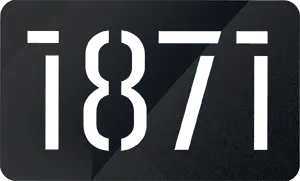By Mike Huffstetler, VP at 1871
Eighty enthusiastic students arrived at 1871 Friday night ready to work, learn, make new connections, and pitch some awesome business ideas.
Student participants hailed from 1871’s four partner universities (IIT, Northwestern, University of Illinois, and University of Chicago), and represented a diverse set of skills (hackers, hustlers, hipsters). It was also an ethnically and gender diverse group with several countries of origin represented (from Niger, China, France, Spain, India, Portugal, Greece, and even “Texas”, as one Texan joked). We weren’t the only ones that noticed. Check this out:

One student was even overheard saying : “I’m really honored to be a part of Campus 1871. I didn’t really realize it was such a big deal!”.
These weren’t just any students either. They were truly the best and brightest from from some of the nation’s top universities – a group of 80 selected from over 300 applicants. Many had started their own companies in the past, and others have already scored internships building technology for some of the world’s leading tech companies. To name a few: two will be spending their summer at Facebook in Palo Alto, four at Google in Mountain View, and one at Twitter San Fran. And for the vast majority of them, this was their first ever trip to 1871.
1871 CEO Howard Tullman kicked off the night with a fast-paced, eye opening keynote: “So, You Want to Be an Entrepreneur?”. Howard shared his ideas about why businesses and technologies fail or succeed, and spelled out the keys to entrepreneurial success through the lens of his 40+ years of experience. While students tweeted and re-tweeted his many entrepreneurial pearls of wisdom, artists were feverishly creating graphic interpretations of the talk:
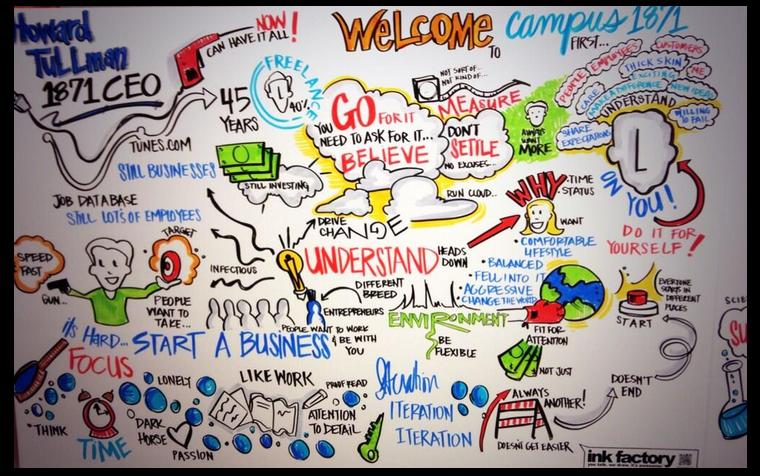
Howard’s presentation slides can be found here, and the session’s main take-aways were his “Eight Things I Would Teach”:
- Tell a Simple Story
- Keep Raising the Bar
- Start with What You Have
- Make “Cheap” Mistakes and Make Mistakes O.K.
- Make Room for People
- You Can’t Add Value without Values
- Run Like the Wind and Don’t Look Back
- Don’t Think for a Minute that You’re Doing It for Someone Else
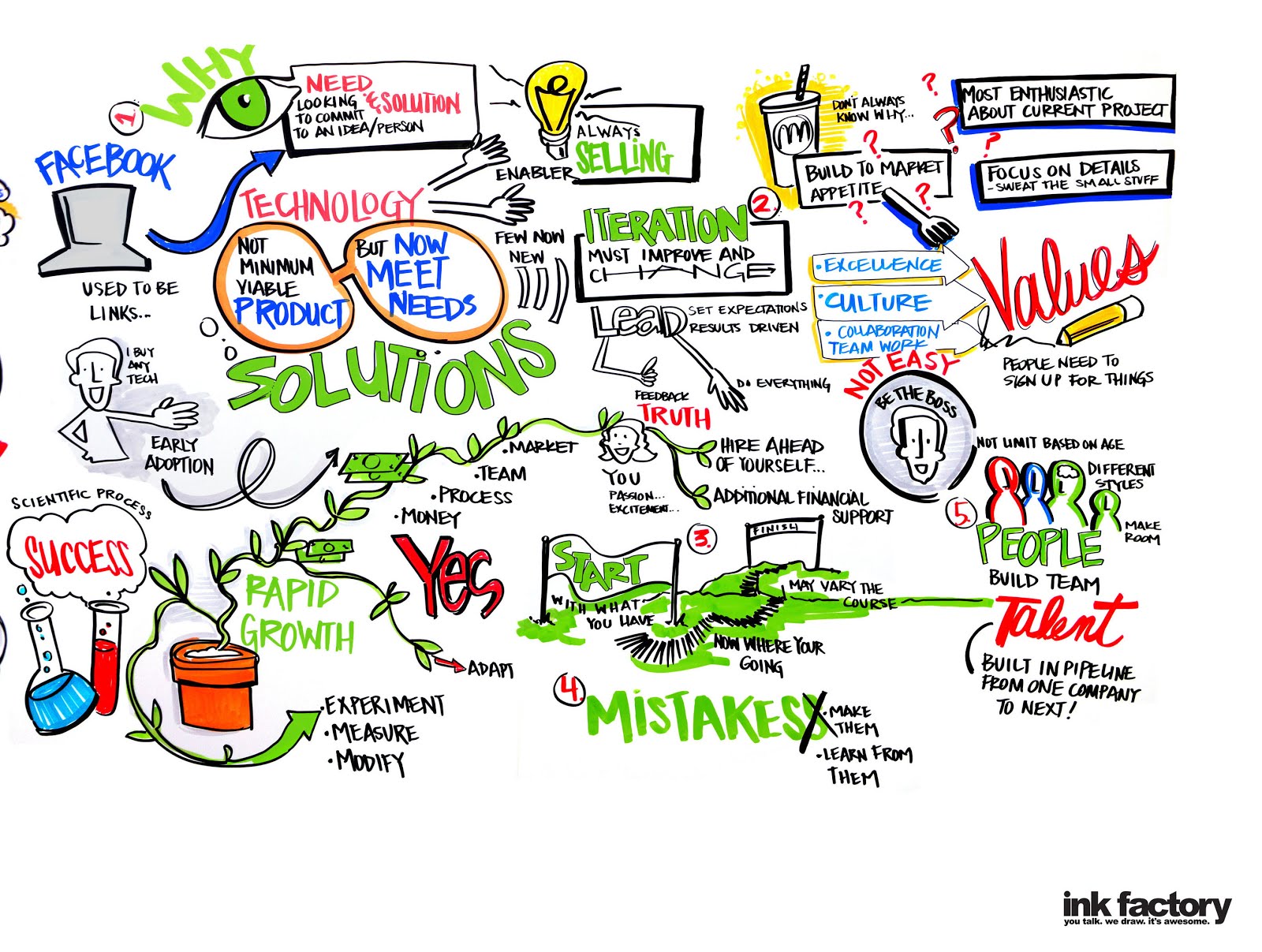
Caption: The Things Howard Would Teach
After Howard’s keynote, the students broke out into teams for an interactive marshmallow challenge, emphasizing the need to quickly build and iterate all weekend long.
. 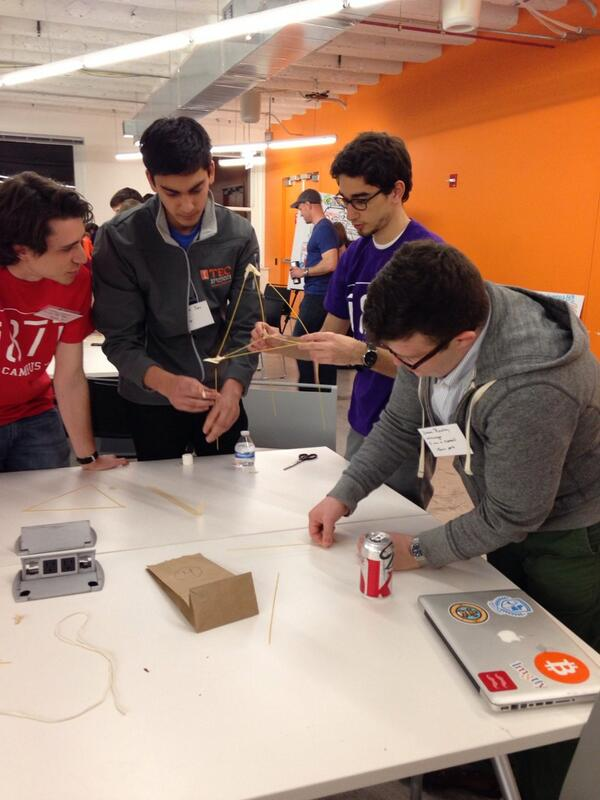
Photo Caption: Students trying to create the tallest spaghetti tower
When it came time for the students to pitch, we were expecting about 10-15 of them to stand up and pitch to the room. We were extremely impressed that 53 students had the courage to share their ideas! Business ideas included more effective ways to manage your to-do lists, a software tool for developers that consolidates all of your API keys, and – not surprisingly considering the audience – better ways to manage sleep, obtain fast food even faster, and a method to get drinks quicker at a crowded bar.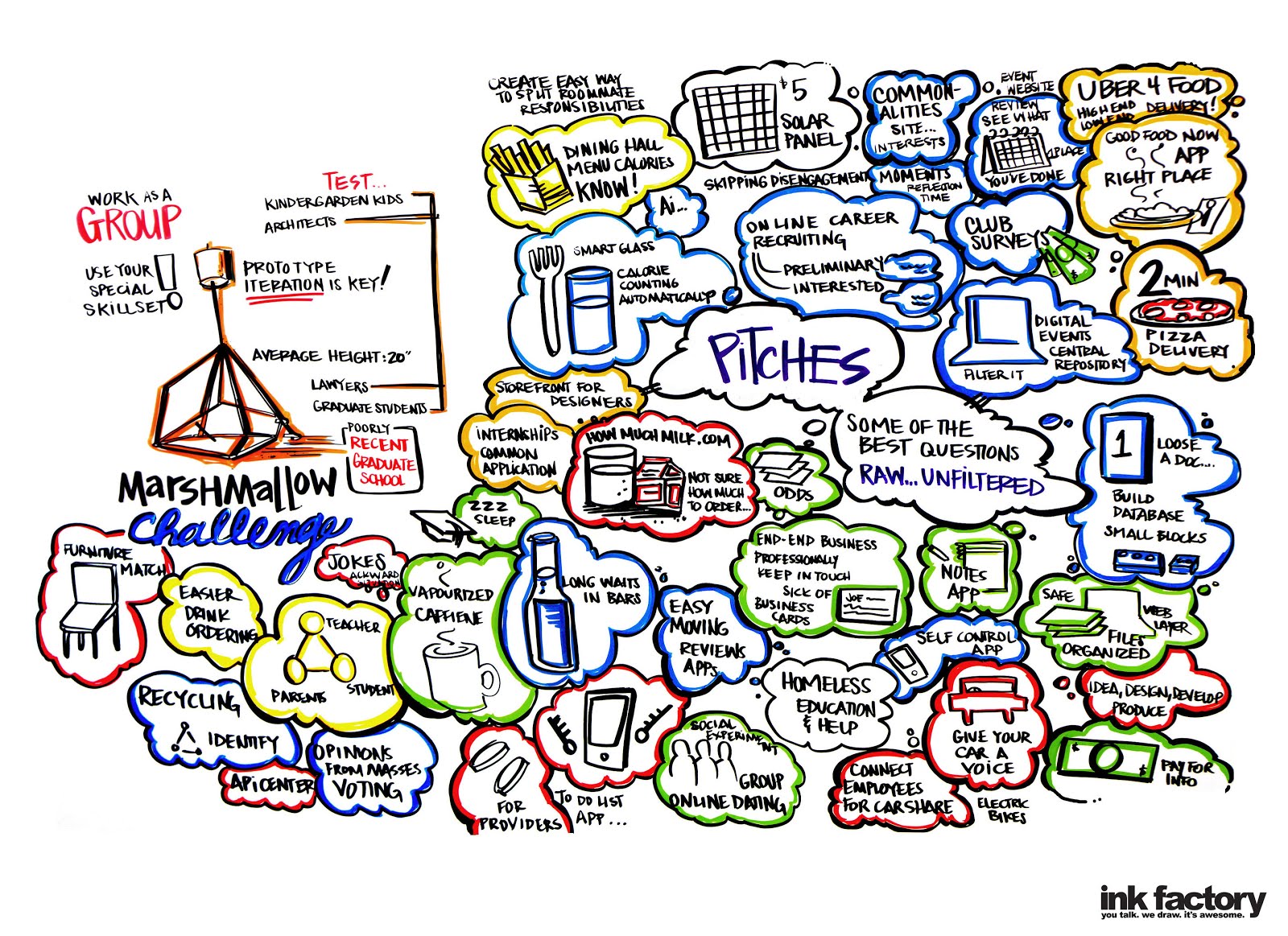
Caption: The Marshmallow Challenge and Friday’s Pitches
Students voted on the top ideas and eventually self-selected into 9 teams ranging in size from 6-8 people. Each team had students representing at least three universities and believe it or not, the collegiate mixes happened organically! We couldn’t have asked for a better outcome! Big thanks to Andy Abbott for joining to Emcee the pitch and selection process.
Saturday was packed full with startup courses and mentors engaging with teams to identify their core problem and validate their ideas in the community. The day kicked off with ADMCi’s workshop about customer validation. Students were taught how to ask the right kinds of questions to to properly validate an idea and fulfill a need in the market place. Using complementary Divvy passes (thanks Divvy!), students explored the city to find and interview potential customers. Upon return, they now had the insights required to synthesize their findings. This led to several thoughtful pivots, and then to ADMCi’s design and prototyping course. Balsamiq was generous enough to provide their robust prototyping product free to all attendees for three months!
Chicago firm Devmynd also offered a course blending both engineering and marketing strategies for User Acquisition, while mentors from Google, Centro, SingleHop, Belly and of course, the 1871 community, were there to help all day (with some staying as late as 2 AM)! In total, we had nearly 50 mentors and volunteers offering help throughout the weekend.
One of the highlights of the weekend’s was Eric Lunt’s Saturday keynote: “A Code to Code By”. It quickly became a student-favorite for this dev-heavy crowd. Some of Eric’s key lessons included:
- Code quality is more important than code quantity.
- Code must be peer-reviewed before it is committed.
- If the code isn’t tested, it isn’t finished.
- Make short iterations, and communicate frequently.
- No territories! No code belongs to one, single person.
- Set code formatting standards.
- Use free, open-source offerings to supplement creation and deployment (you don’t need to pay!).
- Design for scale at the very beginning.
- Any network, i/o can, and will, fail.
- Dev environment should mirror prod environment: at least two of everything.
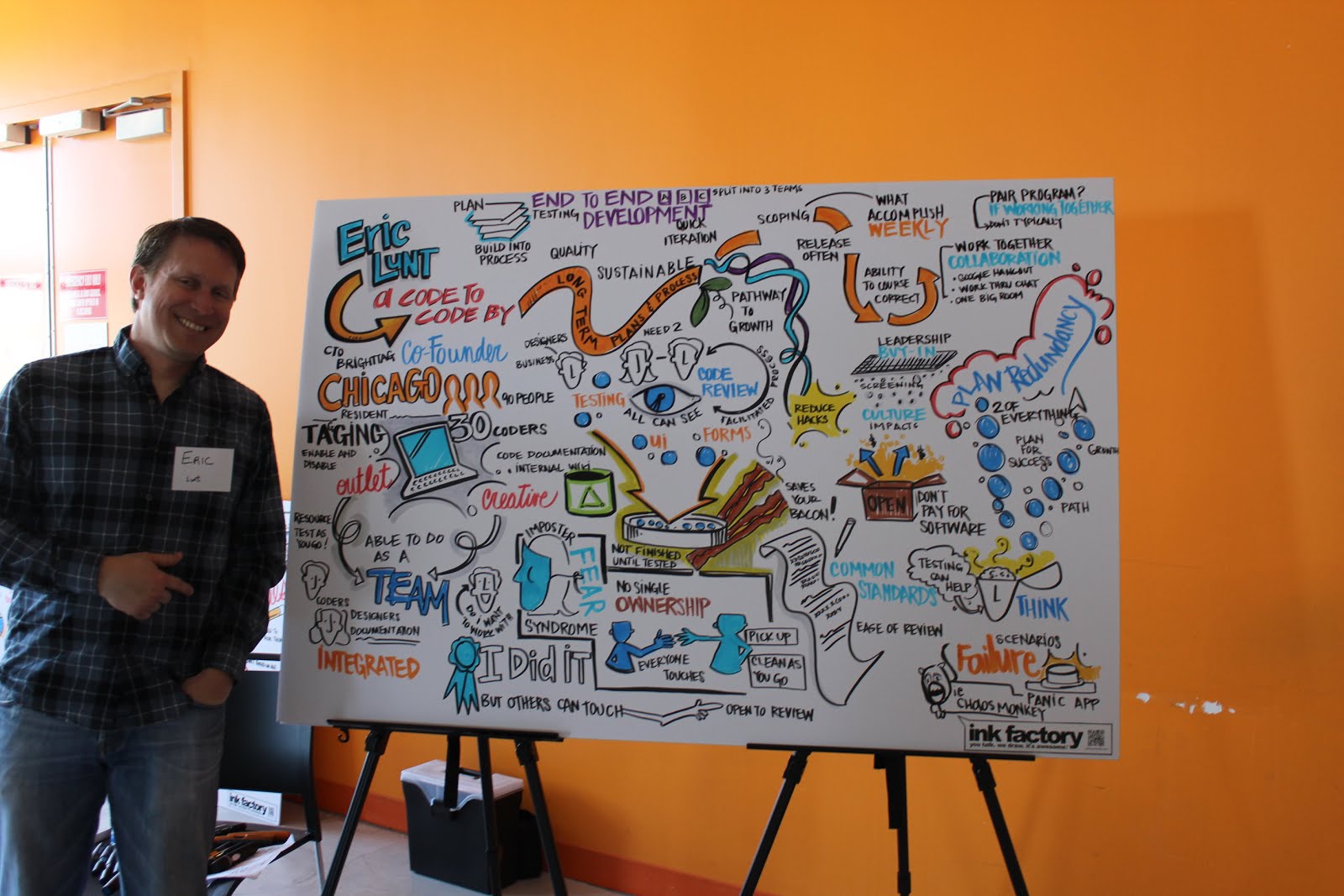
Photo Caption: BrightTag CTO Eric Lunt with his graphic facilitation after his talk, “A Code to Code by.”
A student videographer from U of I was present to candidly capture teams as they worked, and interviewed them one-on-one (final edited video should be here in 1-2 weeks). Mentor and Googler Nicole A. Willis, was also on-hand and took some great photos (you can find them here).
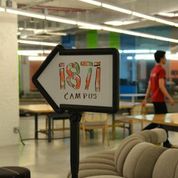

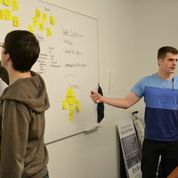
Photo caption: Students collaborating at #campus1871
It was great to see students thinking on their feet, and using agile principles to guide their work throughout the weekend. After vetting, ideas such as “2 Minute Pizza Delivery” turned into “GitFit: Fantasy Sports for Fitness”. A volunteer described the weekend dynamic perfectly:

Our social engagement was pretty significant as well. We had 125 contributors to our #Campus1871 hashtag with only 80 student participants.

Sunday afternoon arrived in a blink of an eye and after a massive amount of late night Lou Malnati’s deep dish pizza delivery on Saturday night (courtesy of SingleHop who also provided free hosting for teams throughout the weekend!), teams added the finishing touches to their presentations. Mentors arrived in the morning to help refine each team’s pitches. The pitches (in order) were:
Alpacu: www.alpacu.com @AlpacuChicago [the winner!]
A team that has collectively moved 51 times, pitches a web service that will take the “sucks” out of “moving sucks”. This team was extremely impressive and was able to prove feasibility, market validation (they talked to 9 different movers), and built an impressive website. Alpacu (“Al – pack – you”) is one platform for sourcing all moving companies and pricing in Chicago.
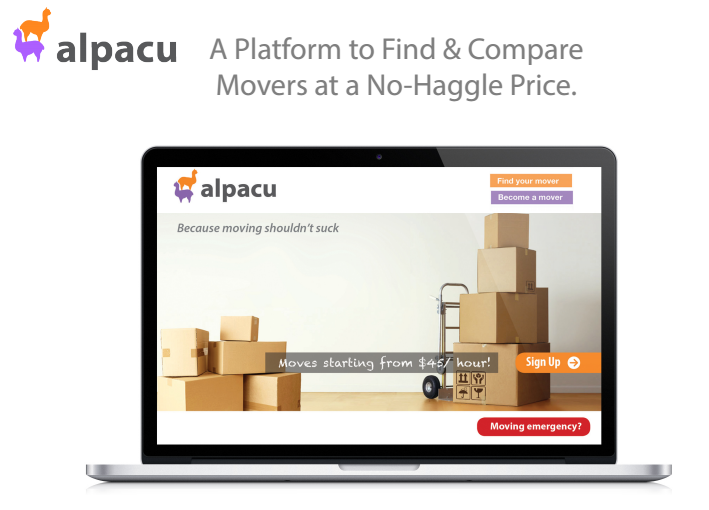
Summr
Summr interns come for the company and stay for the city. Through user generated input and social integrations, Summr is able to recommend experiences to students visiting new cities for temporary amounts of time. This team pivoted several times throughout the weekend and landed on a fun, easy, and fast way to help interns connect with peers.

GitFitApp: tinyurl.com/gitfit1871, @gitfitapp [Honorable mention]
A team that started as “2 Minute Pizza” ended up as GitFitApp; an app that challenges you, through physical activity, to be the MVP of your own fantasy team. Through positive reinforcement and friendly competition, GitFitApp helps you choose your sneakers over the couch.
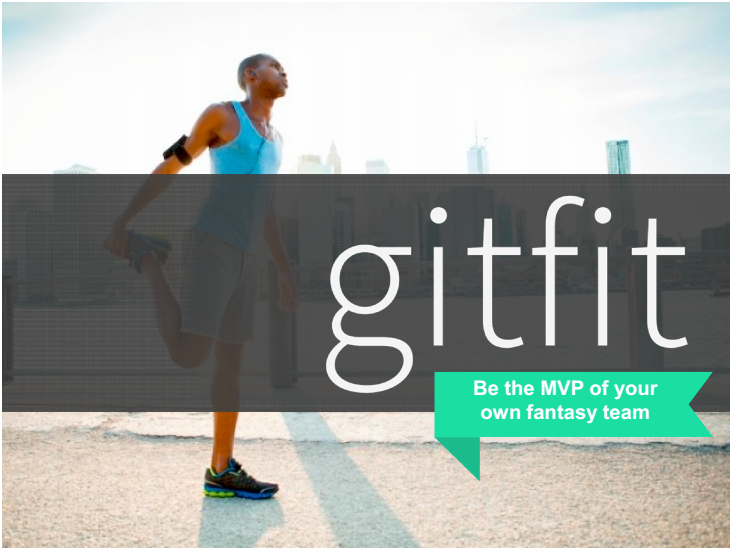
SuprizeMe, http://surprizeme.info.tm/pro/future/
Looking for a unique restaurant experience in Chicago tonight? SurprizeMe provides exclusive (i.e. NOT on Groupon or other deal sites) on-demand restaurant offers to consumers. By becoming the Priceline for food, SurprizeMe allows restaurants to keep their deals exclusive and for consumers to discover new food options.
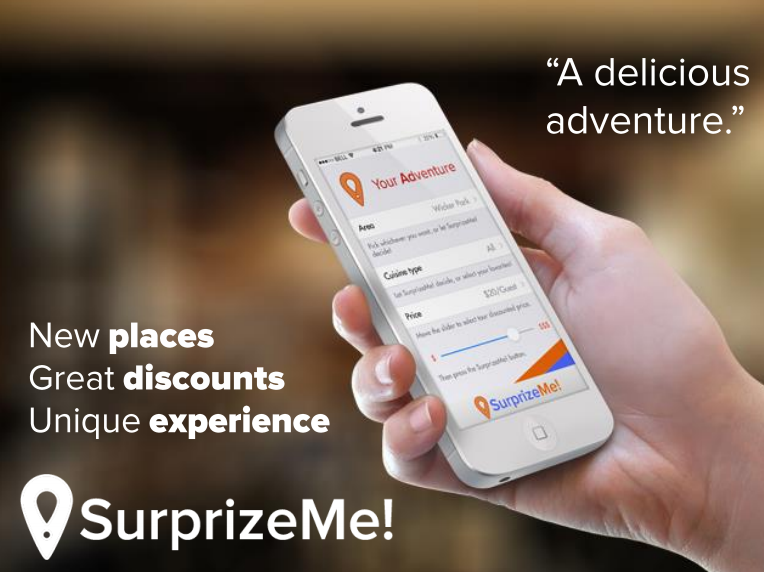
AwkoTaco
This public video sharing tool promotes users to challenge and engage with others that find themselves in awkward and humorous situations. A “vine”-like tool that has the potential to go viral with videos like this one: http://bit.ly/1qdzakb
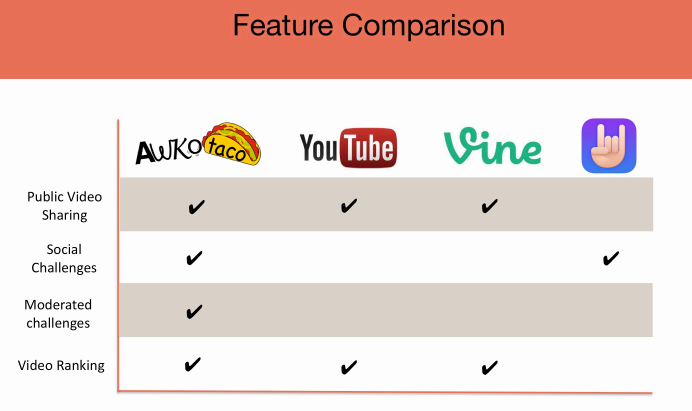
Clarity Clock www.clarityclock.com
What if you could get the first cup of coffee into your system before you wake up? With a desire to kick-off on a crowdfunding platform, this team would revolutionize the way people consume caffeine. Instead of pouring yourself a cup, the Clarity Clock would spray vaporized caffeine in your face when it was time for you to wake up.

YOUnify http://younify.herokuapp.com [third place]
Helping you discover the connections you never knew you had, YOUnify scours your social and professional networks to develop a map of your professional connections. An aggregate picture of your strengths and weaknesses will help you get the referrals you need so you can land your dream job. This idea was originally pitched by former 1871 intern Connor Regan.
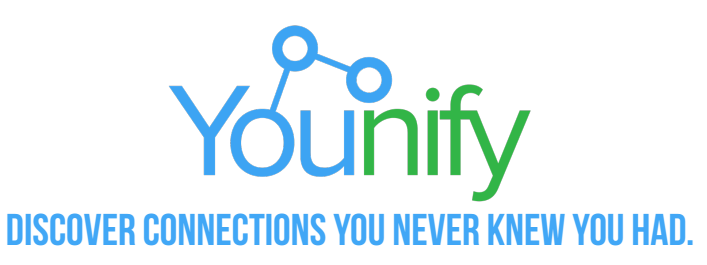
FizzApp http://fizz1871.tk/ [second place]
FizzApp helps take the bottlenecks out of bar operations (and no, they aren’t talking about the beers). Bars struggle to keep up with peak demand, and consumers are frustrated with unreasonable wait times at popular venues. FizzApp streamlines both the bartender and the consumer’s experience by optimizing drink prep, and taking care of the payment processing. Thus, reducing wait times and increasing output.
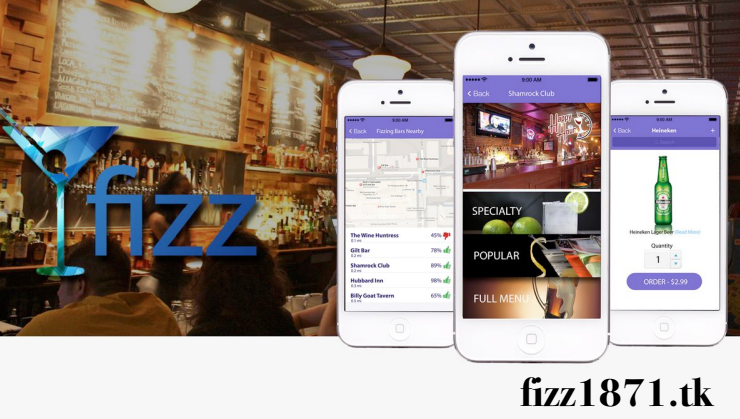
Consequences
It is difficult to maintain motivation when you have no accountability. Consequences connects with your calendar system, geo-targeting, and other tracking tools to help you maintain accountability for your goals and tasks. When you fail to complete your predetermined goals, real life Consequences kick in. From your friends having temporary access to your facebook page, to losing in-app points — consumers have a real incentive to improve their productivity. Don’t go to the gym? Your friend can post whatever they want to your Facebook page. Consequences, because your friends will make you feel a lot worse than your conscience will.
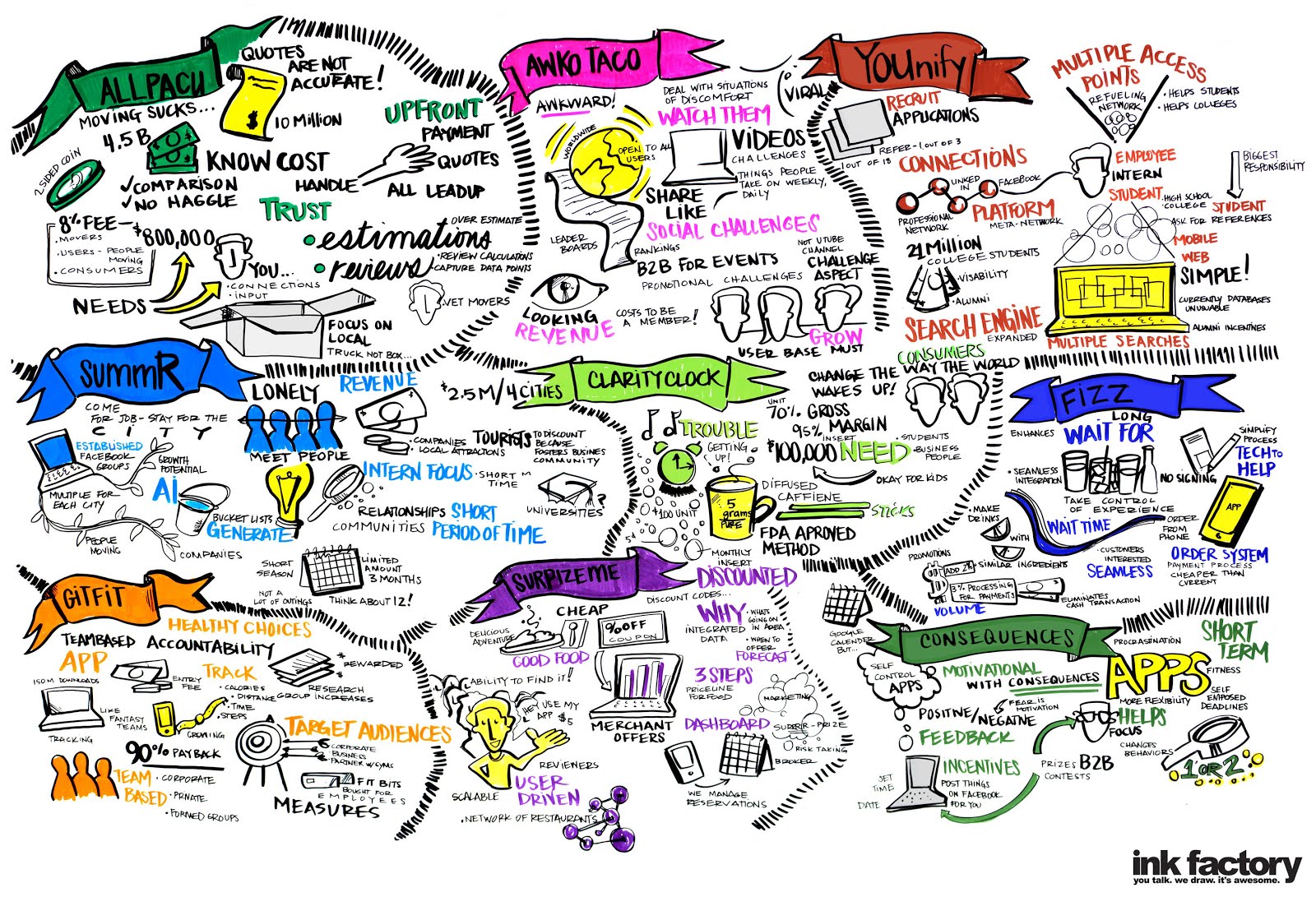
Caption: The Final Pitches on Sunday!
It’s important to point out that these ideas were not preplanned. They were spur-of-the-moment, and all product development and design took place over the course of the weekend (the majority of which happened in 36 hours). By the time of the pitches on Sunday, every one of the teams had a working prototype they were able to demo to the group. Multiple judges (veterans of events like these and business plan competitions) indicated that these pitches were the best they’ve ever seen!
Mark Tebbe, who joined as a judge on Sunday commented in an email: “It was impressive to see how these teams coalesced over the weekend as well as the products of their short but focused effort. The technical talent, depth of the teams and sheer energy level were awesome. This weekend was one of the most impressive weekend events I’ve participated in at 1871.”
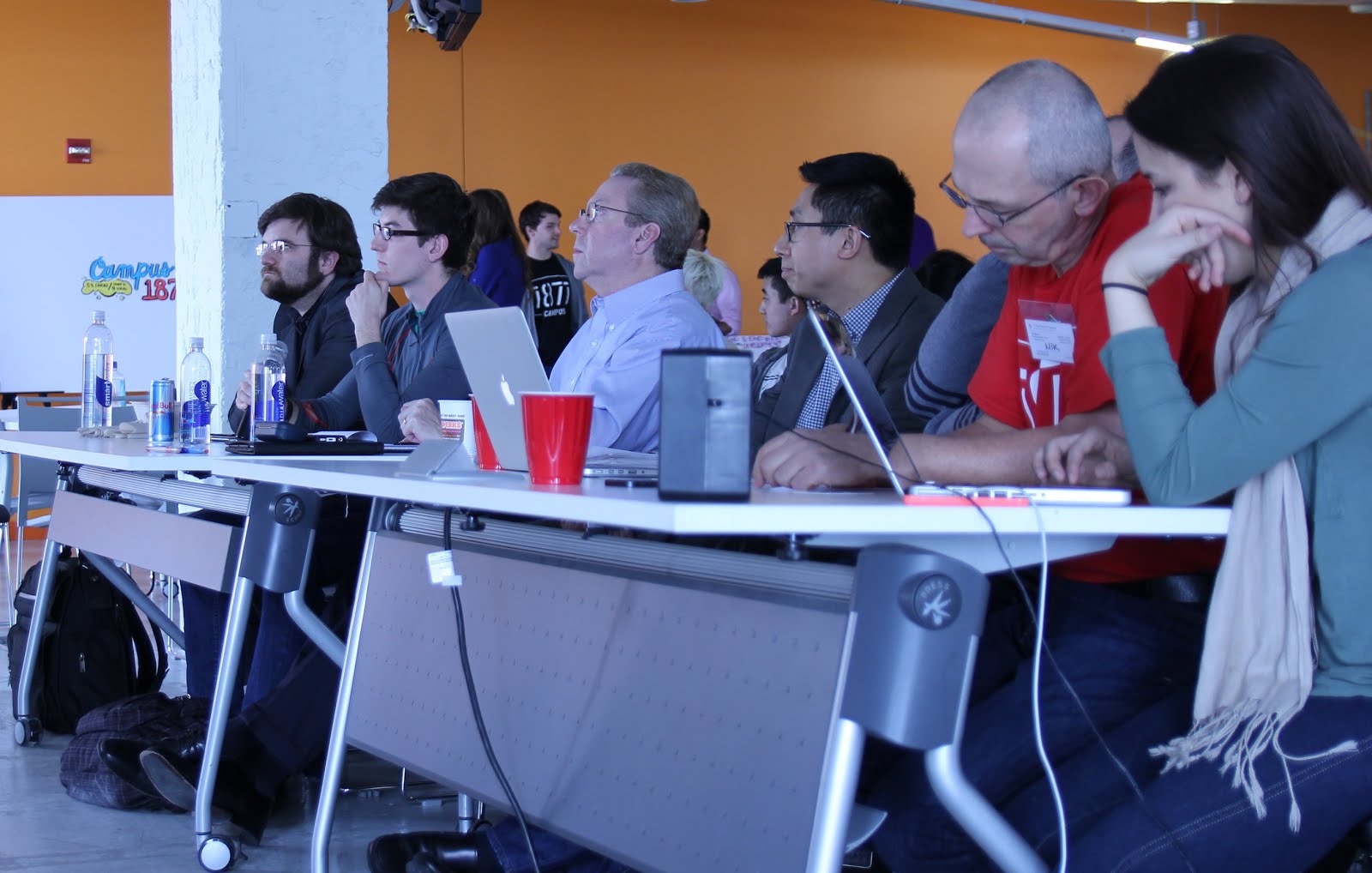
Judges included (from L-R) Seth Kravitz, Jerome Goodrich, Jeff Lyons, Joey Mak, Mark Tebbe (blocked in a trendy grey sweater w/black stripes on sleeve), and Nik Rokop.
All and all, a truly great event. We will certainly be hosting future Campus 1871 events. Everyone from the judges, to sponsors, mentors and university partners/administrators, expressed their delight with the results. Most importantly, the students had fun, and want to come back. They were thrilled with the experience and the opportunity to meet new people, and many asked how they can work out of 1871 or find internships with companies in the community.
A few will get that chance right away, since membership at 1871 was the top prize for the winning teams!
Thank you to everyone who helped make Campus 1871 come together so successfully! Special thanks to our generous sponsors: Google For Entrepreneurs, The Illinois DCEO, Centro, SingleHop, and Balsamiq.
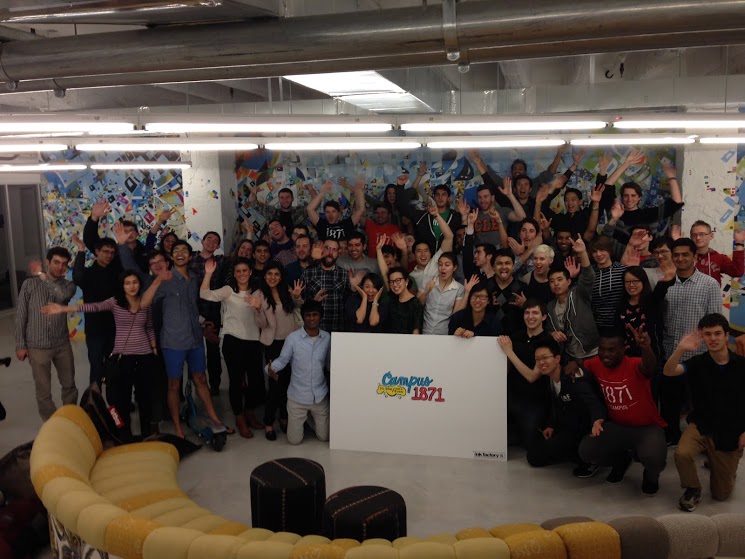
Photo Caption: Campus 1871 attendees just before departure.
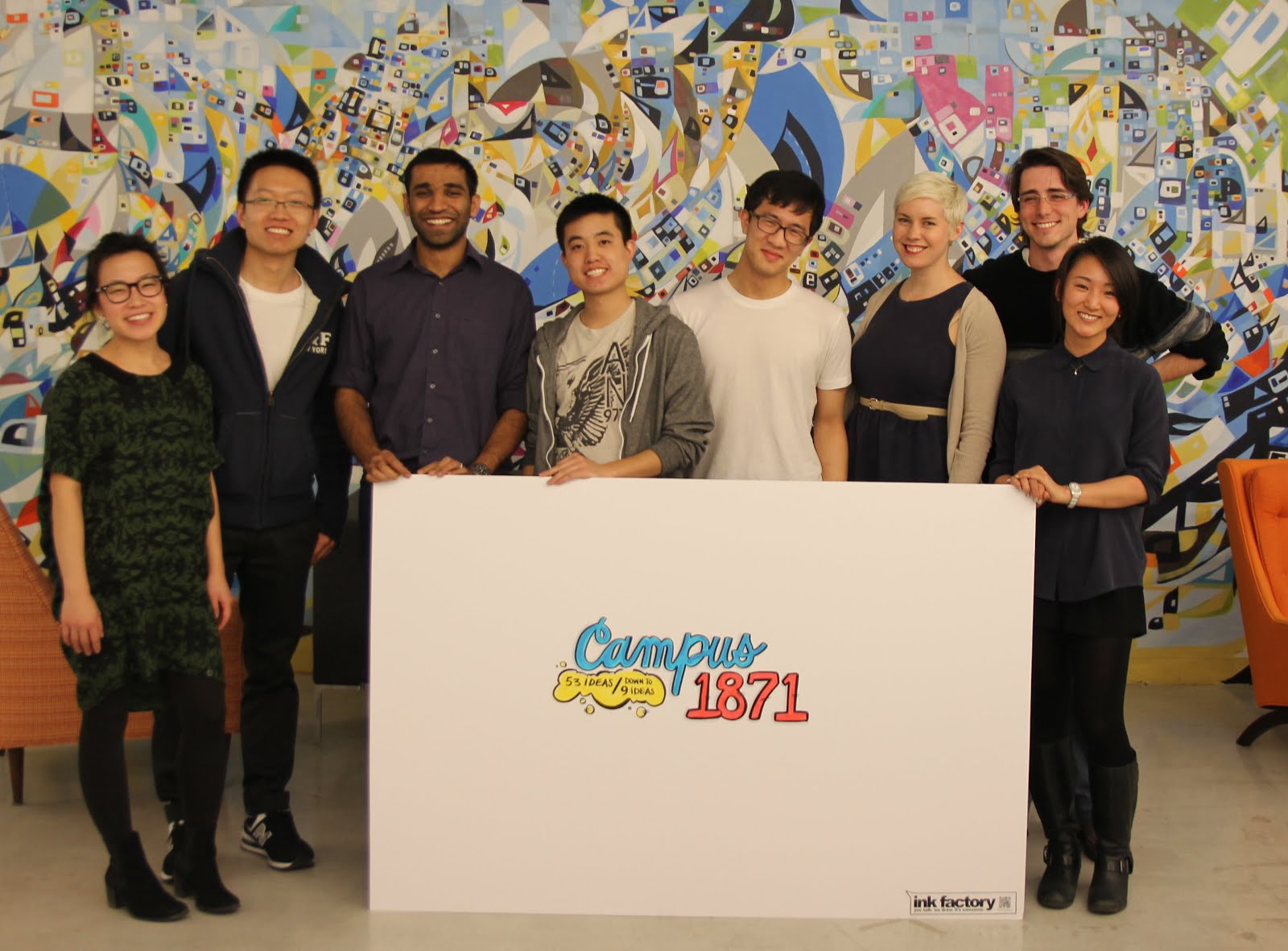
Photo Caption: The winning team, Alpacu.
Join as an 1871 Early Stage Member.
Attend info sessionSubscribe to our ICYMI newsletter.
Share this post:
